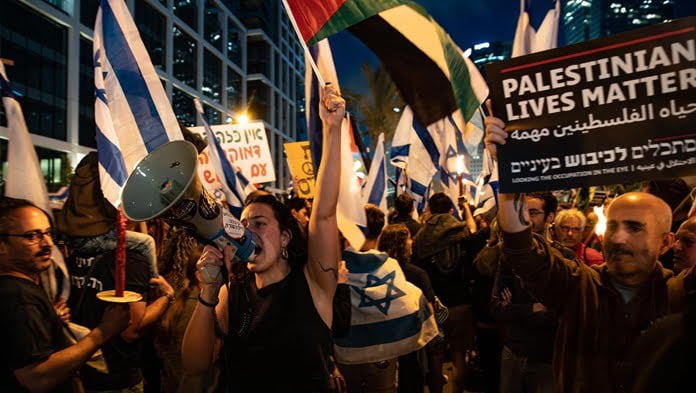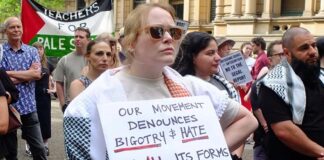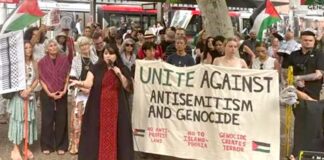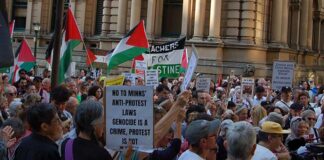What’s it like to be an anti-Zionist Jew in Israel? Solidarity spoke to one such activist, Roni, about why a handful of dissenters continue against all the odds.
Tell us about growing up as a Jew in Israel
I grew up in a home that wasn’t ideologically Zionist—but was by default because it wasn’t anti-Zionist.
My Judaism wasn’t a strong feature of my life because being an Israeli and a Jew are seen as essentially the same thing. So there was not much Jewish education as the surrounding itself is inherently Jewish.
You learn nationalism from early on, in nursery school. In primary school you sing the national anthem every week. You learn the “victimisation narrative”—that Jews have a long history of being victims.
In secondary school you spend six months learning about the Holocaust. You learn about the rise of the Nazis throughout your school years but intensively as part of the VCE equivalent. Following that there are a few more generous months about why Israel has the right to exist—all from the victim perspective.
You’re told that the Nakba (it’s obviously not called that—we learn about it as the War of Independence) started because Arabs (they’re never called Palestinians) blew up a bus after refusing a peace agreement. Because of the war 750,000 people supposedly just “left”.
This is important because it’s the first history you learn in life and it shapes the way you see things later.
How does militarism shape people’s lives?
The education system is a factory for producing soldiers—and I went to a school that was regarded as “leftist”.
Holocaust Day is followed a week later by Memorial Day for victims of war. And the very next day is Independence Day. It’s a festival of ultranationalism.
Former soldiers come to your school in military uniform and you’re encouraged to look forward to becoming one, too. Then you can choose to go on a 10-month pre-military Zionist program to prepare you for becoming a soldier—this is something that I did.
It is sold as a leadership and social program: Zionism = patriotism = love of the land. At that time the Zionist part didn’t stand out to me as problematic.
Like all young Israeli Jews I joined the military and was with Intelligence. I extended my term in the army and became an officer.
I served in the north and in the south against Gaza. I took part in some things that, if I could take them back at any cost, I would.
What changed? How did you break from this system?
I had dinner with a Palestinian friend who asked me what a person like me was doing in the military. I didn’t have an answer. I’d been lying to myself. I’d been enjoying the responsibility and the good money and the feeling of doing something important. I wasn’t willing to face reality.
I had to make a conscious decision to look at a reality that was deeply harmful. I felt trauma and guilt over my role.
My last Intelligence role concerned Egypt and I saw how horrible the Israeli military was towards the young people it deploys, taking away their youth and wasting their time doing irrelevant and harmful things. It all just came together.
I asked to leave the military with a year of my contract to go. One of the things I wrote was that I didn’t believe in what the military was doing and how it was acting in Gaza and the West Bank.
At this point I still wasn’t anti-Zionist. I still separated the occupation of the West Bank and Gaza from the occupation of historic Palestine, the ’48 territories or so-called Israel. But my views got clearer. I started reading more and watching radical movies. Today I don’t believe in the Zionist entity at all.
Do you think others can go down your path and that Israel can change from within?
Can there be change from within? Absolutely not. Israelis are deeply nationalistic. If they talk about equality it’s only for themselves, not for Palestinians.
Israeli society is also very racist and segregated from within, so there are endless internal politics. Since the end of the 1990s Palestinians and the “Palestinian issue” have been completely taken out of the picture—from the public, political and social consciousness. If once, “progress towards peace” was an important factor in political affiliation, it’s not anymore.
A lot of the Israeli left are critical over what happens in the West Bank without being willing to acknowledge the bigger picture. So the Zionist left is against the occupation there but not elsewhere.
The Zionist left does not acknowledge Zionism as the root problem. It only talks continuously about the symptoms arising from it—the settlers in the West Bank, the “ultra-rightwing government” (as if all other governments were not rightwing, and as if the state wasn’t founded on fascism and nationalism), the increasing religiousness of the education system and the public space, the neglect of “Arab-Israelis” (aka Palestinians), etc.
The Zionist left is still very militaristic, nationalistic and unapologetically Jewish-supremacist—in any other society it would not be considered left at all.
Every move towards so-called peace is really about trying to find more subtle ways to oppress the Palestinians. The Oslo Accords in the early 1990s deepened the oppression while pretending to be beneficial.
Even back then change couldn’t have happened from within. Now it’s even worse.
Israelis don’t live in the same reality as Palestinians. In Israel there’s no access to anything anti-Zionist unless you actively search for independent media. Anti-Zionist parties are banned. Even those who support non-violent BDS are marginalised.
The colonial settler state has been ethnic cleansing for almost 80 years to weaken Palestinian resistance and ensure a Jewish demographic majority.
So the population thinks Israel is the saviour of the Jewish people and that they’re in a battle for existence. And everything is organised for Israelis to think this way.
And they hold the military in high regard—it’s idolised. A recent opinion poll showed 86 per cent wouldn’t question the military and have complete trust in it. It is the most trusted state entity, more than the government and the parliament.
Everyone was once in the military and always have plenty of either friends or family in it. In Hebrew they call it “the people’s army”. We anti-Zionists say—it’s not a state with an army, but an army with a state.
If Netanyahu is kicked out as prime minister it may stop the immediate genocide but essentially nothing would change. The system oppresses those who talk about peace, let alone about ending Zionism, justice to Palestinians or de-colonialism.
Israel is inherently genocidal. It needs to be abolished in its entirety.
You’re part of a small anti-Zionist collective, the Radical Bloc, in Yaffa and Tel Aviv. Tell us about it
From December 2022 to 7 October last year, there were big protests over Netanyahu’s government’s attacks on the legal system.
I joined the Anti-Occupation Bloc but I moved to the Radical Bloc because it was clearly anti-Zionist and identifies the colonial settler state as the root of the evil.
The Radical Bloc is a collective of anti-Zionist and anti-military activists. It’s very small—a few tens in Tel Aviv, which is seen as the most “liberal city”. There are other similar groups of activists in Jerusalem and Haifa.
We are predominantly Israeli/Jewish (identifying differently) but not exclusively. It is important to acknowledge that the way we are able to navigate our resistance is privileged in contrast to our Palestinian comrades. Most of us are also active in other groups/struggles.
In reality, the Radical Bloc can’t do much that makes a difference. It’s mostly symbolic. Some of us do something called protective presence, which means going into the West Bank in solidarity with the Palestinians and staying with their communities so that the soldiers and settler-terrorists are less aggressive. Some of us also used to join protests in the West Bank in past years but they haven’t happened since October.
We protest, do vigils and other things like project the number of dead in Gaza on to buildings.
Before 7 October we would take Palestinian flags to protests but we can’t now—it’s more dangerous than ever. They would just be taken down immediately or we would be arrested.
We get sworn at and sometimes people can get physically aggressive towards us. We’re almost always subject to heavy policing. Physical aggression comes from the police or the public.
We’ve had two actions where we put up photos from Gaza, showing the human and physical destruction. People tried to rip the photos down and when we leave they’re gone in seconds.
The Radical Bloc had a protest outside the US embassy, saying the US should stop arming Israel.
We get told that we should go and die in Gaza, and that we’re ungrateful to the soldiers, that we should be swapped for the hostages and that we’re traitors.
Given Israel won’t change and the Radical Bloc can have only a symbolic impact, why don’t activists like you leave the country?
For some people it’s simply that they have lives, homes, families.
For me it’s my home—even if I sometimes feel like an outsider. I constantly question if I should leave for good.
But even if it’s symbolic, there’s a value when it comes to resistance from within, to showing that there are people who stand with the Palestinians and their struggle for liberation and justice.






